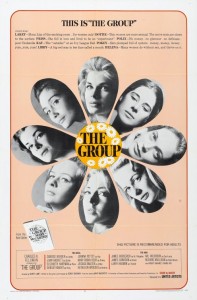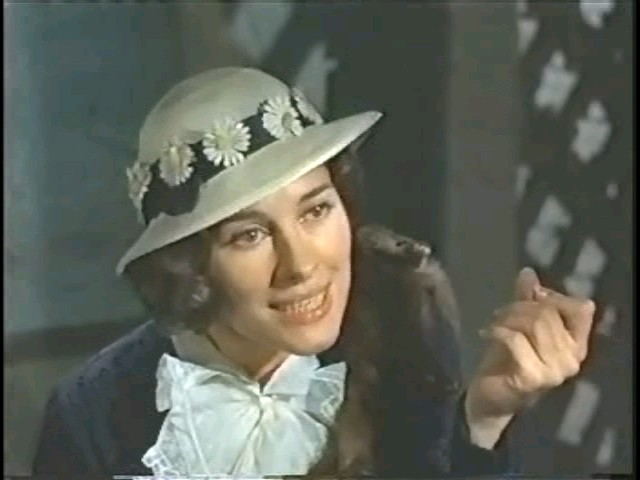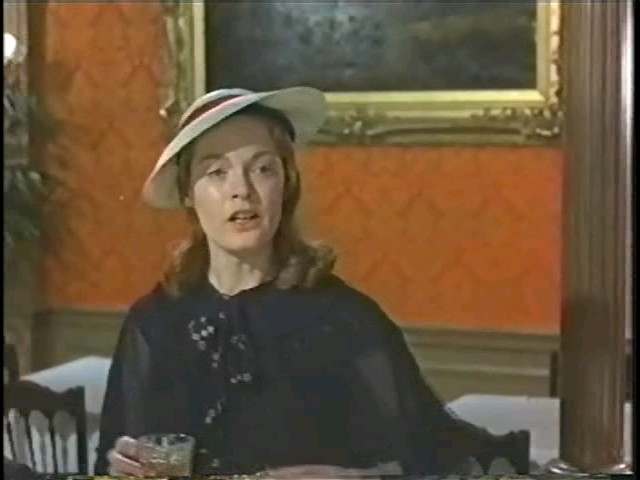Group, The (1966)
“Sacrifice is dated, mother. You don’t reform a man; he just drags you down.”
|
Synopsis: |
|
Genres, Themes, Actors, and Directors:
Review: As with every ensemble film, some vignettes in The Group are inevitably more compelling than others; we find ourselves wishing to know more about certain characters — and much less about others. Shirley Knight turns in a nuanced, compassionate performance as the do-gooding Polly, but her travails (which include an affair with a psycho-analyzed communist, and a mentally ill father) don’t do her justice. Elizabeth Hartman as Priss is equally compelling, and we definitely wish her character had more screentime. Libby — an amusingly clueless character in the book — is, unfortunately, portrayed with annoying smugness by Jessica Walters, and is easily the most irritating of “the group”. Kay’s failing marriage to an alcoholic philanderer (Larry Hagman, perfectly cast, but lacking nuance) is the primary thread of the story, but her character’s gradual transformation is less than convincing. Others in the group barely register at all. Lakey (Bergen in her film debut) is only on-screen for a few minutes at best, and her “surprise revelation” near the end of the movie goes absolutely nowhere. Pokey provides comic relief and little else, while Helena is merely the film’s convenient narrator. Even so, the film is at least 1/2 hour too long. While screenwriter Sidney Buchman tries his best to do justice to all the subplots in the story, eight protagonists is — ultimately — too many. Redeeming Qualities and Moments: Must See? Links: |




2 thoughts on “Group, The (1966)”
Ultimately a must.
It had been years since I’d seen the film; my memory of it was a jumble. (To be sure, no one can accuse the film of NOT being talky.)
It’s true that, in ways, it comes off as being a superficial overview of upper-middle class women of a certain period. However, as my dear friend Sylvia notes, anyone who went to a school like Mount Holyoke College will stand by both McCarthy’s novel and its film version.
Lumet’s film often looks cheap and unrealistic (i.e., low-rent stagey). But it resonates for those of us who have stayed in touch with close friends over the years – why we stay in touch or why we don’t; how we change in the process of growth and continued contact. Even though the film seems to cram a lot into 2 1/2 hours (I feel the length is necessary) – and we spend much time early on trying to remember who’s who – the cumulative effect appears and we learn a sufficient and satisfying amount about each character. It’s ‘Sex and the City’ x 2 – but less stupid.
A strange revelation appears near the end, when Hagman asks Bergen about her relationship with Pettet. The sequence seems to cast aspersions on homosexuality – while putting an oblique light on Pettet’s character.
‘The Group’ is better than I gave it credit for. And it’s probably better through repeat viewings.
Most memorable exchange:
Pettet: Where’s Lakey?
Walter: Oh, uh, Kay… She was feeling awful. Terrible cramps. She had to go back to the hotel and lie down.
Pettet: Oh, is that true, Libby?
Walter: ‘True?’ (laughs) Why, Kay!… (kisses her; walks away)
I’d have to say this one is a must, primarily for the opportunity to appreciate the fine cast. Unfortunately, the scope the film attempts to cover limits the available screen time. Any appearance by Elizabeth Hartman is one to be valued–she’s just terrific in her hospital scenes, especially her phone conversation with Jessica Walter, but she just doesn’t get enough to do. The actresses try to make the most of their segments, however. Joan Hackett and Shirley Knight make a strong impression, yet Hackett basically disappears after her unhappy affair. Widdoes, Redd, and Bergen get very little time to develop their characters. I’ve always been a fan of Joanna Pettet, but she is a little uneven here–her mad scene in the hospital always has me squirming in my seat. But it’s a treat nonetheless to see all them all collected together in what was a major big-budget film for its time. The credit and opening sequences, which “place” the characters, are very effective.
As a side note, in the special features interview for “Play Misty For Me” Jessica Walter says Clint Eastwood was interested in another actress from “The Group” for the role of Evelyn and screened that film to get a look at her. He was impressed by Walter instead and the part in “Misty” went to her. In the interview Walter does not name the other actress, but I’ve always wondered.